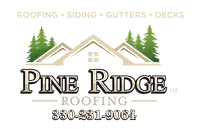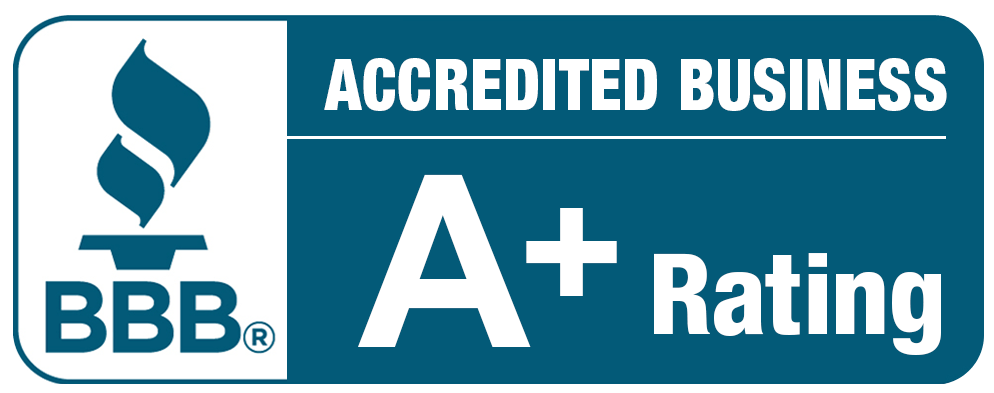Louisville Roof Damage by Weather Conditions and Insurance Claims - A Comprehensive Guide
Your home is your sanctuary, and your roof plays a crucial role in keeping it safe and secure. But what happens when roof damage by weather conditions strikes? Understanding the types of roof damage caused by the elements, navigating the insurance claim process, and knowing how to maintain your roof can make all the difference in protecting your investment.
This comprehensive guide will walk you through everything you need to know to safeguard your home and navigate “roof damage by weather conditions and insurance claims” with confidence.
In Louisville, Roof damage resulting from severe weather conditions like storms, high winds, tornadoes, and hail is a frequent occurrence. At Pine Ridge Roofing we are prepared to offer our support to address these issues.
Key Takeaways
- Weather-related roof damage is caused by wind, hail, rain, and snow.
- Insurance coverage for such damage may vary based on policy type and exclusions.
- Pine Ridge Roofing offers emergency inspection services as well as assistance with roof insurance claims to ensure the best outcome for your claim. In Louisville, Roof Damage issues are handled by our expert roofers.
Table of Contents
Louisville Roof Damage - Types of Weather-Related Roof Damage
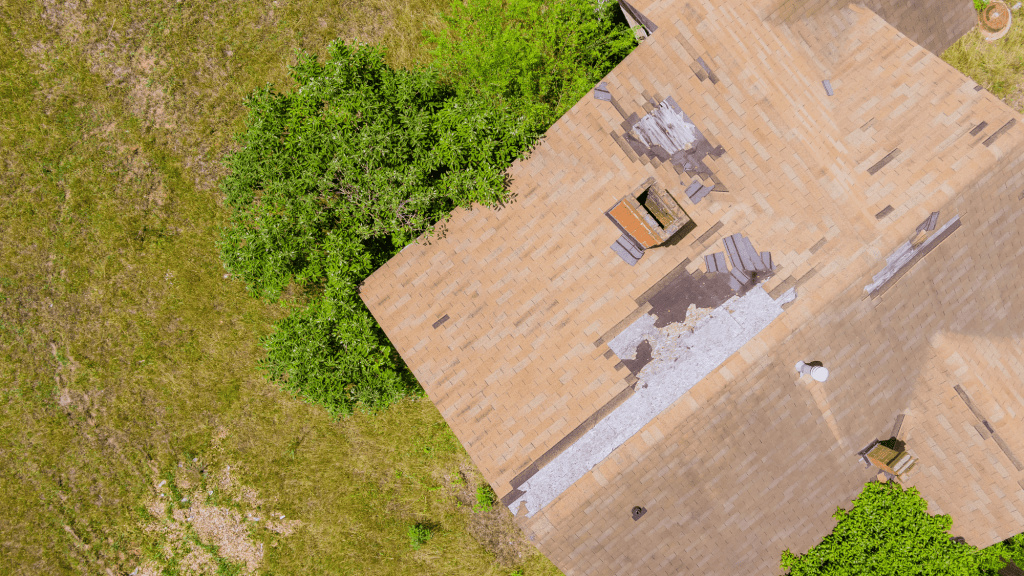
In Louisville, roof damage from unpredictable weather conditions is a prevalent concern. Weather elements such as wind, hail, rain, or snow can wreak havoc on roofs, frequently resulting in insurance claims and the need for expensive repairs or replacements.
Safeguarding your home involves identifying signs of storm damage and understanding how these natural forces affect your roofing materials.
A critical question often arises: Is roof damage covered by insurance? To secure coverage for your roof damage expenses through home insurance, it’s crucial to demonstrate that the damage directly resulted from an extreme weather event.
Wind Damage
In Louisville, roof damage caused by high winds can silently jeopardize the condition of your roof. This damage may manifest as missing shingles, lifted flashing, or cracked tiles, and in severe cases, it might result in the complete displacement of the roof. Despite appearing minor initially, these damages can escalate over time, leading to leaks and structural issues that necessitate initiating the roof insurance claim process.
Repairing an older roof introduces challenges, particularly with less flexible and prone-to-cracking shingles. It is imperative to involve a qualified roofing specialist for a meticulous roof inspection and to promptly address any damage.
Gaining insight into the wind insurance coverage specifics in your homeowner’s insurance policy is pivotal for preparedness, especially during adverse weather conditions such as storms.
Wind damage can stem from various weather events, including severe storms or hurricanes. Consistently monitoring your roof’s condition post such events is essential, and taking swift action upon observing visible signs of wind damage is critical. If, for instance, a sizable tree branch is discovered on your roof, it is advisable to have it professionally removed to prevent further damage and potential roof damage claims.
Hail Damage
When a hailstorm sweeps through, it has the potential to cause significant damage to your roof, leaving behind dents, punctures, and shingle granule loss. Despite this damage being not immediately visible to the untrained eye, its consequences for your roof’s longevity and functionality are substantial. Hail can bruise or crack the shingle mat, creating openings that allow water to gradually infiltrate your home, potentially leading to the necessity of a roof claim.
Roof inspection for hail damage can be challenging, especially after a storm. Insurance adjusters and roofing professionals often consider metal components surrounding the roof, such as:
- Roof vents
- Pipe boots
- Gutters
- Roof flashing
It is important to exercise caution and refrain from inspecting the roof immediately after a storm, particularly if it has a steep slope. In cases of considerable hail damage, taking swift action, such as securing tarps to the roof, becomes essential to prevent further deterioration from rainwater.
Rain and Snow Damage
Rain and snow may seem harmless, but they can wreak havoc on your roof if not properly managed. Here are some potential issues caused by rain and snow:
- Leaks and water damage
- Structural issues
- Roof collapse due to the weight of accumulated snow
- Ice dams, which can damage your roof and gutters
It’s important to take steps to protect your roof from these potential problems.
Employing preventative tactics, such as regular inspections, ensuring ample ventilation, and effective waterproofing, is crucial to protect your property from the damaging effects of rain and snow. Stay ahead by actively managing your roof’s maintenance and gaining insight into homeowner’s insurance coverage options like Actual Cash Value (ACV) and Replacement Cost Value (RCV) policies, thereby reducing the likelihood of facing substantial expenses for repairs or replacements caused by weather-related damage.
Louisville Roof Damage - Insurance Coverage for Weather-Related Issues

The financial safety net provided by the insurance company is indispensable in the wake of unforeseen roof damage in Louisville, OH. However, grappling with the nuances of insurance coverage can be an intimidating prospect. Familiarizing yourself with policy nuances, such as Actual Cash Value (ACV) and Replacement Cost Value (RCV), and staying mindful of typical exclusions can significantly impact how your claim is addressed and ultimately settled.
Policy Types: ACV vs RCV
An Actual Cash Value (ACV) policy is structured to cover the replacement of your roof by reimbursing you for its depreciated value, after deducting the applicable deductible. This implies that you’ll receive compensation based on the current value of your roof at the time of the damage. However, it’s crucial to note that this amount may not suffice to cover the entire cost of repairs or replacement.
On the other hand, a Replacement Cost Value (RCV) policy provides more comprehensive coverage. It covers the complete cost of roof replacement, offering funds for a new roof based on current market prices and materials. Under an RCV policy, you’ll initially receive a check for the actual cost value of your roof. After the roof replacement is finalized, a second check for the remaining amount will be issued, subject to meeting all specified requirements.
The choice of a suitable policy for your needs can greatly impact the payout you receive in the event of a roof damage claim, making it an important decision. It is essential to:
- Review your insurance policy
- Understand the differences between ACV and RCV
- Consult with your home insurance company to ensure you have the appropriate coverage for your specific situation.
Common Exclusions
While homeowners insurance policies can provide financial protection for weather-related roof damage in Louisville OH, it is important to be aware of common exclusions that may affect your claim. Some typical exclusions include:
- Improper installation: This refers to roof installation that does not adhere to the manufacturer’s instructions or local building codes, which can result in accelerated wear and tear and may invalidate your roof’s warranty.
- Lack of maintenance: Neglecting regular roof maintenance, such as cleaning gutters and removing debris, can lead to damage that may not be covered by your policy.
- Specific weather events not covered by your policy: Some insurance policies may exclude coverage for certain weather events, such as hurricanes or earthquakes.
It is important to review your insurance policy carefully and understand the exclusions to ensure you have the appropriate coverage for your roof.
Inadequate maintenance occurs when a roof is not regularly inspected and maintained according to the manufacturer’s instructions or local building codes, possibly leading to premature deterioration and warranty invalidation.
Understanding common exclusions and ensuring your roof is properly installed, maintained, and protected from excluded weather events can help you avoid potential claim denials and ensure you receive the coverage you deserve. By staying informed and taking a proactive approach to roof maintenance, you can minimize the risk of costly repairs or replacements due to weather-related damage.
Louisville Roof Damage - Filing an Insurance Claim
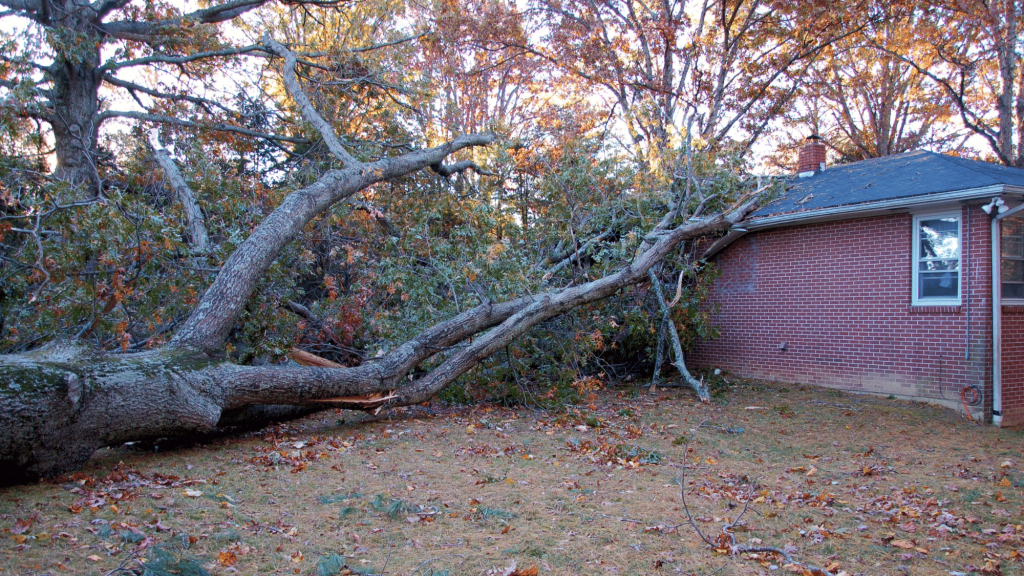
Navigating the process of filing an insurance claim for roof damage in Louisville, Ohio requires a well-thought-out approach. From meticulous documentation of the damage to effective collaboration with insurance adjusters and making wise decisions when choosing a roofing contractor, each step is crucial for a successful claims process.
This guide provides a comprehensive overview, guiding you through the necessary steps and offering valuable tips to ensure a smooth and successful insurance claim experience for roof damage.
Documenting the Damage
Thorough documentation plays a pivotal role when initiating an insurance claim for roofing damage. It is imperative to meticulously follow these steps:
- Capture comprehensive photos of the affected areas, highlighting any missing shingles, lifted flashing, or cracked tiles.
- Compile a detailed list of the damage, accompanied by thorough notes that include dates, times, and any relevant weather events contributing to the damage.
- If preventive measures have been taken, such as securing tarps to the roofing, ensure to photograph these protective measures.
After documenting the damage, seek an estimate from a certified roofing contractor to assess the repair or replacement costs. This estimate not only clarifies the extent of the damage but also serves as crucial documentation when presenting your claim to the insurance company. Maintaining a comprehensive and precise record of the roofing damage significantly enhances the likelihood of a successful claim.
Working with Adjusters
In Louisville, roof damage evaluation involves the integral role of insurance adjusters in determining the value of your claim payout. Collaborating effectively with these adjusters is paramount for securing the best possible outcome for your claim. It’s crucial to provide accurate information, maintain thorough records of all interactions and pertinent documents, and uphold honesty throughout the process.
When faced with a denied claim, exploring various resolution options is essential:
- Consider asking your insurance company for a different adjuster to obtain a second opinion.
- Alternatively, engaging a structural engineer for a comprehensive inspection and evidence of the damage is a viable step.
- As a last resort, legal avenues can be pursued.
Understanding the adjusters’ role and being well-prepared to work with them increases the likelihood of a successful claim. This ensures you receive the necessary coverage to repair or replace your roof damaged in Louisville.
Choosing a Reputable Roofing Contractor
Choosing a reputable roofing contractor assures quality work and facilitates a smooth claims process. When researching roofing contractors for insurance claims, consider their experience with insurance claims, turnaround times, and their ability to work with adjusters. A qualified roofing contractor can accurately document the damage according to insurance companies’ requirements and provide an expert assessment.
Choosing a local and reliable roofing contractor, such as Pine Ridge Roofing, can provide peace of mind knowing that your roof repair or replacement is in good hands. Their team of certified roofers and insurance specialists is available to assist with storm repair, restoration, and insurance claims in Louisville, Ohio, and the surrounding areas. By selecting an experienced roofing contractor, you can ensure the safety and integrity of your home.
Louisville Roof Damage - Preventative Measures and Maintenance
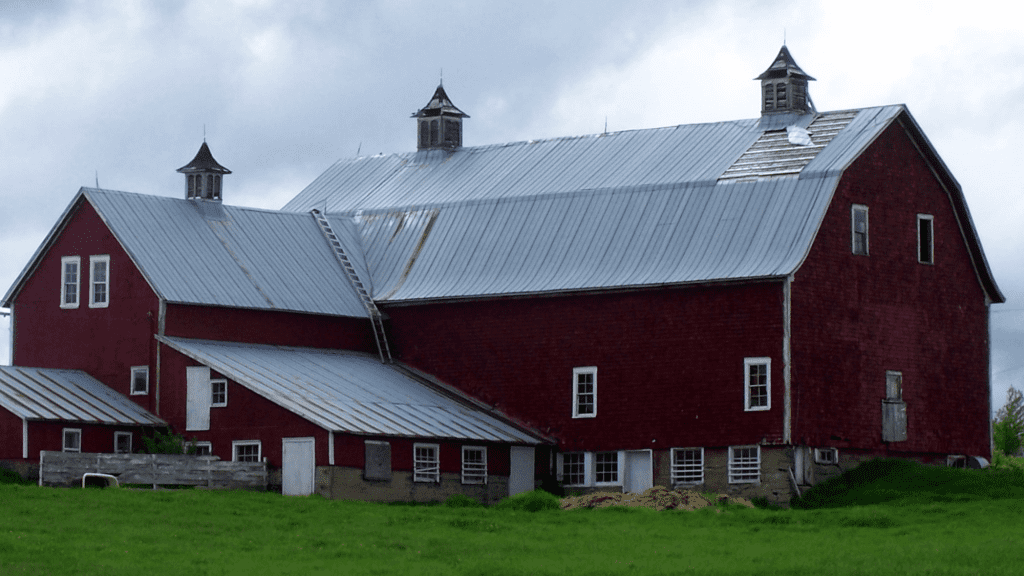
Acting as a financial safety net for weather-related roof damage, insurance is a valuable asset. However, proactive steps are essential to avoid hefty repair costs altogether. Regular inspections, ensuring adequate ventilation, and effective waterproofing play pivotal roles in maintaining your roof’s excellent condition. By implementing these preventive measures, you not only minimize the risk of weather-related damage but also contribute to the overall durability of your roofing structure.
Routine Inspections
Regular roof inspections serve as an effective method to spot and tackle potential issues before they escalate into significant problems. Inspections should evaluate the roof for signs of:
- Deterioration
- Missing or damaged shingles
- Debris in the gutters
- Roof ponding
Maintaining your roof’s health requires regular inspections, especially in areas exposed to extreme weather. Conduct these inspections at least bi-annually to stay ahead of potential issues.
Being proactive in addressing minor problems can save you significant money by preventing the need for costly repairs or a full roof replacement. Pine Ridge Roofing, a trusted contractor, offers free roof inspections to assess and maintain your roof’s integrity. Call us today to schedule your inspection and secure the long-term health of your roof.
Proper Ventilation and Waterproofing
Preventing moisture buildup, ice dams, and other weather-related roof damage necessitates proper ventilation and waterproofing. Effective ventilation and waterproofing practices include:
- Ensuring good indoor air quality
- Implementing proper home ventilation
- Using exhaust fans and air purifiers
- Installing a sound ventilation system
- Properly attaching roof ventilation products
Inadequate ventilation and waterproofing can result in moisture accumulation, ice dams, and other weather-related damage, potentially necessitating costly repairs and replacements. By ensuring your roof is properly ventilated and waterproofed, you can minimize the risk of damage and maintain the performance and, lifespan of your roofing materials.
Pine Ridge Roofing: Your Partner in Roof Repair and Insurance Claims
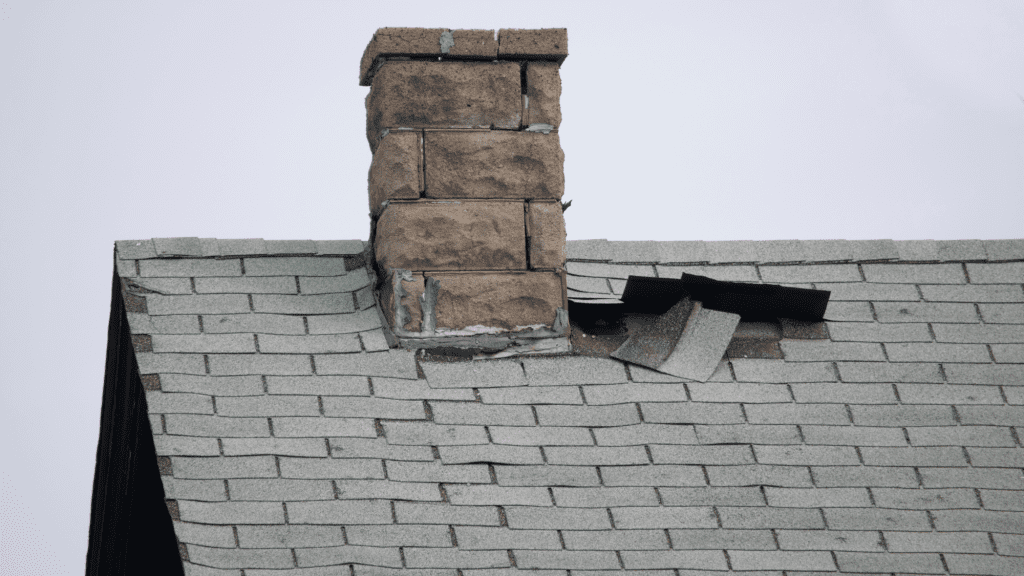
Pine Ridge Roofing, serving Louisville, Ohio, and surrounding areas, specializes in:
- Storm damage repairs
- Insurance claims
- Emergency inspection
- Tarping services
- Assistance with insurance claims for weather-related roof damage
- Roof replacements
- Siding repair and replacement
- Gutter repair and replacement
- Leaf Guard Installation
- Deck building
With a combined experience exceeding 25 years, our team of certified roofers and insurance specialists is unwavering in its commitment to providing excellent roof repairs. We are dedicated to safeguarding and restoring your home following any weather-related damage event.
Emergency Inspection and Tarping Services
When you suspect roof damage, scheduling a free emergency inspection with Pine Ridge Roofing can help you assess the extent of the damage and determine the best course of action for repairs or replacement. Our team of professionals will conduct a thorough evaluation of your roof, identifying any missing shingles, lifted flashing, or cracked tiles that may require immediate attention.
In addition to emergency inspections, Pine Ridge Roofing offers the following services:
- Tarping services provide temporary protection and prevent any further damage to your roof
- Acting quickly and securing your roof with tarps to minimize the risk of additional damage
- Ensuring your home remains safe and secure throughout the insurance claim process
Insurance Claim Assistance
Navigating the insurance claim process can be overwhelming, but Pine Ridge Roofing is here to help. They offer the following services:
- Assisting with insurance claims
- Representing homeowners
- Negotiating with insurance companies
- Providing quality roof replacement services
Count on Pine Ridge Roofing’s insurance claim expertise to secure the best possible outcome for your claim, allowing you to prioritize the safety and well-being of your family. Their comprehensive insurance claim assistance includes:
- emergency inspections
- tarping damaged areas
- representing homeowners during insurance adjuster meetings
- negotiating with insurance companies, and using top-notch products like Owens Corning shingles and synthetic felt for roof replacements.
Pine Ridge Roofing ensures that your roof repair or replacement is conducted with professionalism and efficiency, giving you peace of mind and the assurance that your home is safeguarded.
Summary
The challenge of weather-related roof damage in Louisville, Ohio is one that every homeowner may face. It’s crucial to comprehend the diverse types of damage, adeptly manage the insurance claim process, and take proactive steps for roof maintenance. Armed with the insights from this comprehensive guide and the support of Pine Ridge Roofing, a reputable contractor, you can face weather-related roof damage with confidence, assuring the safety and security of your home and family.
Frequently Asked Questions
Does Home Insurance Cover Roof Storm Damage?
Home insurance policies vary in their coverage of roof storm damage, contingent on the terms outlined in your specific plan. Most insurance plans typically include protection for damages inflicted by hail, strong winds, destruction from falling objects, and internal harm caused by roof storm damage. To illustrate, if a storm results in your roof’s destruction and subsequent rainwater damage to the ceiling, your insurance policy is likely to cover the necessary repairs for both the roof and ceiling.
Are blown-off shingles covered by insurance?
Insurance companies often grasp the critical importance of a sound roof and usually extend coverage to encompass the expenses linked to replacing a roof, especially when damage occurs due to unpreventable factors like the dislodging of shingles.
What is considered wind damage to shingles?
The impact of wind on shingles is often characterized by tearing, creasing, or separation from the roof’s surface. This vulnerability is particularly notable in three-tab shingles, where the risk increases due to consistent lifting or flapping. Notably, unsealed shingles remain resistant unless there is observable physical mat damage.
My roof doesn’t leak. Does this mean my roof is okay?
Just because your roof doesn’t exhibit leaks, it doesn’t necessarily indicate that your roof is in perfect condition. In numerous instances, roof damage isn’t immediately visible, and leaks might not manifest during the next rainfall. Concealed damage can persist unnoticed for an extended period. Skilled roofing professionals, as we have at Pine Ridge Roofing, possess tools and techniques that enable them to identify moisture beneath roofing materials and identify areas of damage that might otherwise go unnoticed. Schedule your free inspection now!
What is the most common roof damage?
Leaking roofs are the most common roof damage in Louisville OH, often caused by broken shingles, and improper flashing near the chimney or gutters, and around vents or pipes.
